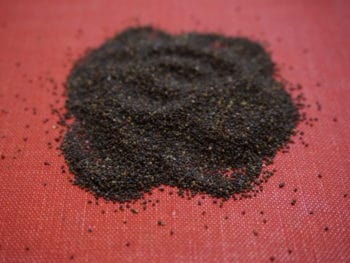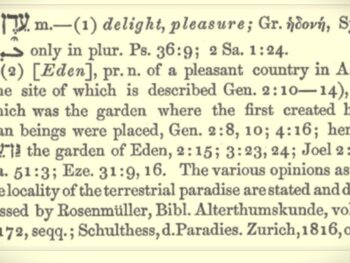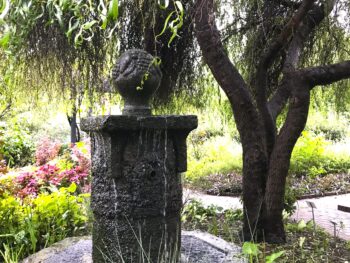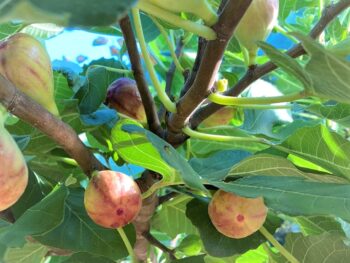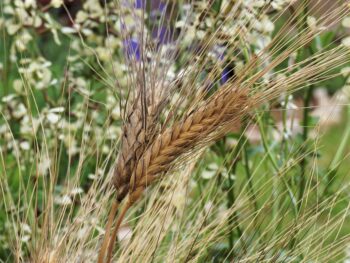Fall temperatures have finally settled in, and with them much garden work to do to tidy up and take down the tremendous plant growth of spring and summer. Though it appears we are at garden’s end, spring has already begun in our hearts…don’t we have the bulb orders to prove it!?! In this manner, the autumn garden glorifies the practice of Simchat Torah, an observance in the Jewish faith at the end of the Feast of Tabernacles, occurring at the beginning of this week.
Simchat Torah
Simchat Torah, translated as “Rejoicing in the Torah,” celebrates the “no beginning and no end” study of Torah, its never-ending, continual contemplation and governance in the lives of God’s people. In synagogue services, the last chapters of Deuteronomy are read in sequence with the first chapters of Genesis, setting a daily pace for year-round reading that will be completed, same time, next year, with the end of Deuteronomy and the beginning of Genesis. To read the end and the beginning together signifies that Torah is a perpetual study, a pursuit ever-present in the holy life.
Autumn Garden Glorifies

We gardeners know the continuum of end and beginning intuitively, as nearly every fall clean-up chore shines with the glimmer of spring prep. We hold the hint of next year’s harvest in gathering seed heads from our favorite herbs and annuals. Seed suppliers remind us it is now time to scatter wildflower seeds, allowing their soak in winter’s snowmelt for a well-timed spring emergence.

Bulb companies promote the planting of tulips, narcissus, and garlic, to name a few, as the fleshy nuggets will be working underground, sending out roots and reading themselves for soil’s softening in spring.

We rake leaves (yes, sometimes still in pajamas!) anticipating the benefits of their decomposing into mulch and compost, for winter’s protection and spring soil’s replenishment. We cut back spent perennials, all the while excited for their spring resurrection.
Even evergreen sales are up, as fall is the best time in most climates to install trees and large shrubs, giving them get a head-start on securing roots for next year’s growth. The two are hand-in-hand, a simultaneous start and finish, a constant compliment to each other, a perpetuity expressed in God’s poetic reassurance to Noah:
As long as the earth endures,
seedtime and harvest,
cold and heat,
summer and winter,
day and night
will never cease.
Genesis 8:22 NIV
Deuteronomy’s End…
Linger with me a moment to consider the final Words of Deuteronomy in concert with the first chapter of Genesis. What a powerful one-two punch, an earthy blast of God’s stop-and-take-notice glory. The Torah’s fifth book ends with the touching expression of God’s relationship with Moses as one of “face-to-face”:
And there arose not a prophet since in Israel like unto Moses, whom the Lord knew face to face…
Deuteronomy 34:10 KJV
The face-to-face characterization describes in a figurative sense the personal nature of how they got along together, in an attentive, intimate knowing; with direct, forthright meetings, and a surety that they would recognize each other. How much is exposed and detected in expressions on our faces—communication that goes unspoken in accepting grins, generous glances, lingering gazes, or quick tips of the head or gardener’s hat—all a transfer between one another of loving reassurance, validation, and often a propelling green light to go ahead or get moving.
This is God’s way, to relate face-to-face? How astonishing! He is willing and desires to engage people in this manner? How dumbfounding! May this life-changing awareness captivate our hearts and endear us all over again to our Lord, preparing for the coming seasons.
…with Genesis’ Beginning
And how much more dazzling when considering the sheer force and creative power unleashed in first chapter Genesis, as the emerging form, establishment, and order of earth and nature came into existence: day, night, sky, land, seas, seed-bearing plants, sun, moon, and stars and ensuing seasons; creatures of sea, air, and land, their nourishment, their flourishing increase, and finally mankind in God’s image.
In the beginning God created the heavens and the earth. Now the earth was formless and empty, darkness was over the surface of the deep, and the Spirit of God was hovering over the waters. And God said, “Let there be light,” and there was light… God saw all that he had made, and it was very good.
Genesis 1:1-4, 31 NIV
click to read the entirety of Genesis 1
It seems counter-intuitive to me that force-filled, creator-supreme who plans and acts and forms and shapes on epic scales, moving massive amounts of materials, and establishing seasonality, seedtime and harvest for all-time, would be of the inclination to relate at a human’s personal, lowly level. Wouldn’t He be too ambitious, too above, too end-game focused for that??? And yet in the sequential reading of Deuteronomy 34, Genesis 1, and Genesis 2, the comprehensive, imposing, extensive act of creation is sandwiched between face-to-face intimacy.
Moving to Genesis’ second chapter, we read that God scooped up a handful of soil and formed a body, in Hebrew adamah and adam, His life-giving gush of air passing through Adam’s nose, by arrangement a face-to-face moment:
And the Lord God formed man of the dust of the ground, and breathed into his nostrils the breath of life; and man became a living soul.
Genesis 2:7 KJV
Do you find it a matter of rejoicing that God draws near enough to his people to gaze in their eyes, breath life, speak intimately? Mary found it so! “My Sprit rejoices in God, My Savior,” sang Mary, “for He has been mindful of the humble state of his servant” (Luke 1:48 NIV), also translated in The Message:
And Mary said,
I’m bursting with God-news;
I’m dancing the song of my Savior God.
God took one look at me, and look what happens—
Luke 1:48 The Message
And that is the celebration of Simchat Torah, to dance, sing, and rejoice with the Torah scrolls filling the sanctuary!
Prayer: O Lord, as I retire my garden this fall, let me rejoice! Its return and renewal are already on the way. There is “no beginning and no end,” only a perpetual beauty and goodness awaiting me here in the garden, and epic reflections of You, Your Word, Your Ways. May all the details I know of my garden-keeping remind me all the details you know about me, held in the context of care, favor, and blessing, from beginning to forever.
May the Lord bless [your] land with the precious dew from heaven above and with the deep waters that lie below;
with the best the sun brings forth and the finest the moon can yield;
with the choicest gifts of the ancient mountains and the fruitfulness of the everlasting hills;
with the best gifts of the earth and its fullness and the favor of him who dwelt in the burning bush.
Deuteronomy 33:13-16 NIV

Special thanks to Ayala Golan, Community Manager at the Rosen School of Hebrew for teaching on Simchat Torah, visit www.rosenhebrewschool.com
Photo Credits:
©2019 Shelley S. Cramm




